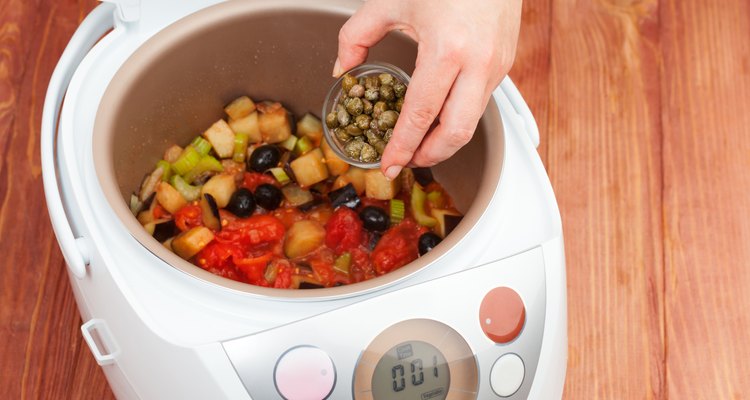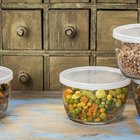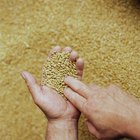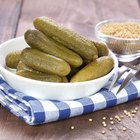
yuryRumovsky/iStock/Getty Images
Using a slow cooker, or crock pot, to cook your meals helps save on total meal preparation. After combining all the ingredients into the slow cooker, you can let your meal cook while you are at work or engaged in other activities. In addition, foods cooked this way may have more flavor because of the longer cooking time. By controlling the ingredients added, cooking in a slow cooker can improve the nutrient content of your meals.
History
Slow cookers were first introduced in 1971 by the company Rival. In fact, bean cookers were the precursors to the first slow cooker, as it was found other foods produced good results when slowly cooked. Since 1976, the inside of the slow cooker has been removable for easier cleaning.
In addition to improving the flavor and texture of some foods, slow cookers can also save time. Meals can be prepared in the morning and cook during the workday.
Increasing Nutrients
As with any cooking method used at home, you have control over the nutrient profile of your meal. For instance, adding more vegetables than called for in the recipe increases the nutrients while creating a meal that is more filling due to the fiber and bulk of vegetables.
When tough cuts of meat are used, the longer cooking time and moist cooking method result in meats that are fork tender without the addition of fat or tenderizers. In addition, these more tough cuts are generally lower in fat, helping to lower the overall fat and calorie content of the meal.
Nutrient Loss
With all cooking methods, there can be a breakdown in nutrients, although a few nutrients such as lycopene become more available with processing. The advantage of a slow cooker over other methods is that the foods are cooked at a relatively low heat for a longer time. This lower heat may not destroy as many nutrients as other methods such as steaming or boiling. Another benefit is that with slow cooker meals, the nutrients can often be recaptured when the resulting sauces or juices are served with the meal.
Limiting Processed Foods
Using a slow cooker, you are able to reduce your consumption of processed foods. Reducing the consumption of processed foods decreases the intake of sodium, fat and calories in your diet. Meals that you may have purchased from the boxed or frozen section of the store can be made at home with your slow cooker. For example, you can find slow cooker recipes for baked desserts, casseroles, soups and roasts. You are only limited by your creativity. Reducing these nutrients also increases the nutrient density, or the ratio of calories to nutrients, of the meal.
Food Safety
Without proper cooking in your slow cooker, the safety of your food may be questionable. Poor food handling makes the food unsafe and depending on the procedure, may further reduce nutrients when they are exposed to air or bacteria. You will want to follow recipes from reputable sources and the instruction manual that came with your slow cooker to ensure preparation of safe foods made in your slow cooker.
Related Articles

How to Steam Vegetables in an Electric ...
Does Slow Cooking Take Nutrients Out of ...

Benefits of GMO Foods

The Definition of Non-Cognitive Skills

Ancient Indian Cooking Methods

Toxins From Reheating Cooked Green ...

Are the Nutrients Lost in Slow Cooking?

Is the Slow Cooker a Healthy Way to ...

How to Make Teriyaki Sauce
Convection Oven vs. Pressure Cooker

Dilution In Cooking

How to Ferment Grains

Nutritional Effects of Overcooking

Juicing to Tighten Flabby Skin

Health Benefits of Organic Foods Vs. ...

How to Convert Stovetop Recipes to ...

Processed Food Definition

The Advantages of Pickling Foods

The Positive Effects of Using a ...

Fruits & Vegetables: Carbon Dioxide ...
References
Writer Bio
Jessica Kovarik has been writing nutrition, healthy and physical fitness articles for three years. She is a registered, licensed dietitian. Kovarik specializes in sports nutrition, exercise physiology and medical nutritional therapy for heart health, celiac disease and diabetes.
Photo Credits
yuryRumovsky/iStock/Getty Images